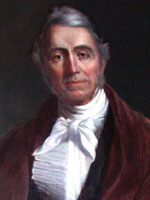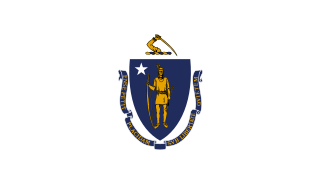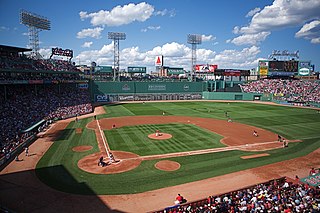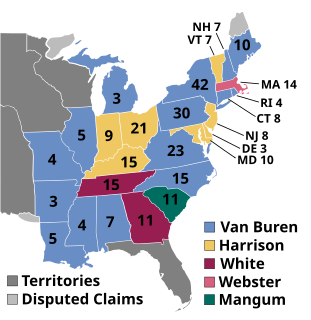
The United States presidential election of 1836 was the 13th quadrennial presidential election, held from Thursday, November 3, to Wednesday, December 7, 1836. In the third consecutive election victory for the Democratic Party, incumbent Vice President Martin Van Buren defeated four candidates fielded by the nascent Whig Party.

The 1840 United States presidential election was the 14th quadrennial presidential election, held from Friday, October 30, to Wednesday, December 2, 1840. In the midst of the Panic of 1837, incumbent President Martin Van Buren of the Democratic Party was defeated by Whig nominee William Henry Harrison. The election marked the first of two Whig victories in presidential elections.

The United States presidential election of 1852 was the seventeenth quadrennial presidential election, held on Tuesday, November 2, 1852. Democrat Franklin Pierce, a former Senator from New Hampshire, defeated General Winfield Scott, the Whig nominee. This was the last election in which the Whigs served as the principal opposition to the Democrats.

The 1860 United States presidential election was the nineteenth quadrennial presidential election to select the President and Vice President of the United States. The election was held on Tuesday, November 6, 1860. In a four-way contest, the Republican Party ticket of Abraham Lincoln and Hannibal Hamlin emerged triumphant. The election of Lincoln served as the primary catalyst of the American Civil War.

James Chamberlain Jones was an American politician who served as the Governor of Tennessee from 1841 to 1845, and as a United States Senator from Tennessee from 1851 to 1857. A Whig, Jones twice defeated rising politician James K. Polk for the governorship. He was the first native-born Tennessean to be elected governor.

John Davis was an American lawyer, businessman and politician from Massachusetts. He spent 25 years in public service, serving in both houses of the United States Congress and for three non-consecutive years as Governor of Massachusetts. Because of his reputation for personal integrity he was known as "Honest John" Davis.

Levi Lincoln Jr. was an American lawyer and politician from Worcester, Massachusetts. He was the 13th Governor of Massachusetts (1825–1834) and represented the state in the U.S. Congress (1834–1841). Lincoln's nine-year tenure as governor is the longest consecutive service in state history; only Michael Dukakis, John Hancock and Caleb Strong served more years, but they were not consecutive.
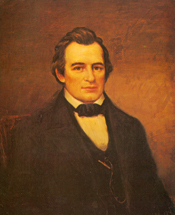
Elections to the United States House of Representatives for the 26th Congress were held during President Martin Van Buren's term at various dates in different states from July 1838 to November 1839.
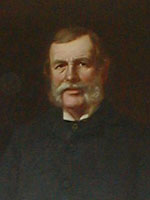
Henry Joseph Gardner was the 23rd Governor of Massachusetts, serving from 1855 to 1858. Gardner, a Know Nothing, was elected governor as part of the sweeping victory of Know Nothing candidates in the Massachusetts elections of 1854.
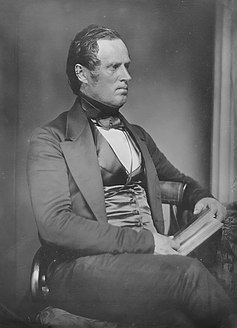
George Nixon Briggs was an American lawyer and politician from Massachusetts. A Whig, Briggs served for twelve years in the United States House of Representatives, and served seven one-year terms as the 19th Governor of Massachusetts, from 1844 to 1851.

John Henry Clifford was an American lawyer and politician from New Bedford, Massachusetts. He served as the state's attorney general for much of the 1850s, retaining the office during administrations dominated by three different political parties. A Whig, he was elected the state's 21st governor, serving a single term from 1853 to 1854. He was the first governor of Massachusetts not born in the state.
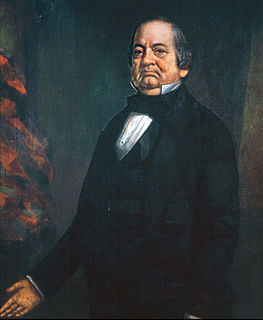
Robert Perkins Letcher was a politician and lawyer from the US state of Kentucky. He served as a U.S. Representative, Minister to Mexico, and the 15th Governor of Kentucky. He also served in the Kentucky General Assembly where he was Speaker of the House in 1837 and 1838. A strong supporter of the Whig Party, he was a friend of Henry Clay and John J. Crittenden.
Straight-ticket voting or straight-party voting is the practice of voting for every candidate that a political party has on a general election ballot. In general, straight-ticket voting was a very common occurrence until around the 1960s and 1970s. Since that time, straight-ticket voting has declined in the United States among the general voting population; however, strong partisans have remained straight-ticket voters.
The 1839/1840 United States Senate election in New York was held on February 5, 1839, and January 14, 1840, by the New York State Legislature to elect a U.S. Senator to represent the State of New York in the United States Senate.
The United States Senate elections of 1840 and 1841 were elections which, corresponding with their Party's success in the 1840 presidential election, had the Whig Party take control of the United States Senate.
The United States Senate elections of 1838 and 1839 were elections which had the Democratic Party lose seven seats in the United States Senate, but still retain a majority.
"As Maine goes, so goes the nation" is a phrase that at one time was in wide currency in United States politics. The phrase described Maine's reputation as a bellwether state for presidential elections. Specifically, Maine's September election of a governor predicted the party outcome of the November presidential election in 19 out of the 26 presidential election years from 1832 to 1932, or 73 percent of the time. The accurate years were from 1832 through 1844, in 1852, from 1860 through 1876, in 1888, from 1896 through 1908 and from 1920 through 1932.

In 1840, William Henry Harrison was elected President of the United States. Harrison, who had served as a general and as United States Senator from Ohio, defeated the incumbent president, Democrat Martin Van Buren, in a campaign that broke new ground in American politics. Among other firsts, Harrison's victory was the first time the Whig Party won a presidential election. A month after taking office, Harrison died and his running mate John Tyler served the remainder of his term, but broke from the Whig agenda, and was expelled from the party.

